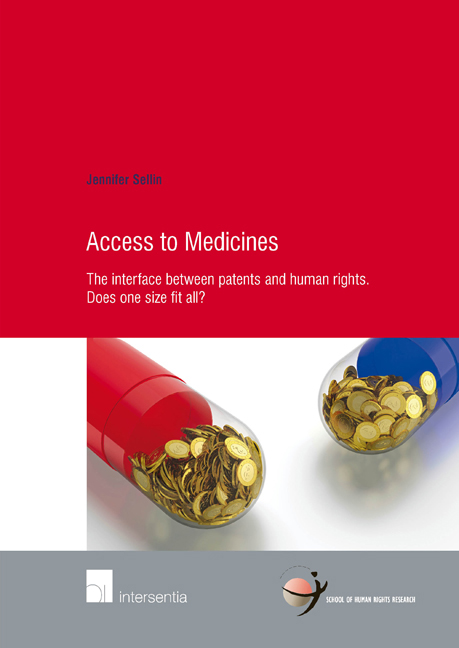Book contents
- Frontmatter
- Dedication
- Acknowledgements
- Contents
- List of Abbreviations
- Part I Method and Problem Statement
- Part II International Framework
- Part III Country Studies
- Chapter 6 Access to Medicines in South Africa
- Chapter 7 Access to Medicines in India
- Chapter 8 Access to Medicines in Uganda
- Chapter 9 Findings, Conclusions and Recommendations
- Bibliography
- Curriculum Vitae
- Miscellaneous Endmatter
Chapter 7 - Access to Medicines in India
from Part III - Country Studies
Published online by Cambridge University Press: 22 November 2017
- Frontmatter
- Dedication
- Acknowledgements
- Contents
- List of Abbreviations
- Part I Method and Problem Statement
- Part II International Framework
- Part III Country Studies
- Chapter 6 Access to Medicines in South Africa
- Chapter 7 Access to Medicines in India
- Chapter 8 Access to Medicines in Uganda
- Chapter 9 Findings, Conclusions and Recommendations
- Bibliography
- Curriculum Vitae
- Miscellaneous Endmatter
Summary
INTRODUCTION
The second country study conducted in this research is on India. India is classified as a lower middle income country with a GNI per capita of US$ 1,330 (2010); it has a poverty headcount ratio of 37.2% of the population, life expectancy of 65 years, and a under-five mortality rate of 63. India is a WTO member since 1 January 1995. Although still a developing country, India is an up-and-coming economic power house. For years it has made use of the lack of (product) patent protection for pharmaceuticals to copy and produce pharmaceuticals, resulting in it now being one of the largest producers and exporters of generic medicines. However, the end of the transitional periods of the TRIPS Agreement for India in 2005 has lead to significant changes in its patent law. In implementing its TRIPS obligations in several instances it has tried to make use of the flexibilities available, such as for example section 3d of its Patents Act, which attempts to prevent ever-greening. Moreover, although the Indian Constitution protects health as a non-justiciable directive principle of state policy, its extremely progressive judiciary has interpreted the right to life to include health rights, indirectly making it a justiciable right.
The aim of this country study is to examine whether India has complied both with its obligations under international human rights law and the TRIPS Agreement with a view to achieving a balance between access to medicines and patent protection. Firstly, this chapter will take a closer look at the problem of lack of access to medicines in India (section 2). Thereafter, the question is posed whether India has complied with its obligation under international human rights law with respect to guaranteeing access to affordable medicines by examining the constitutional and legislative framework (section 3); and whether, and to what extent, it has implemented TRIPS’ patent standards and flexibilities (section 4). In addition, TRIPS-plus developments are also briefly touched upon (section 5) before, finally, posing the essential question, namely whether India has been able to strike a balance between protection of patents for pharmaceuticals and access to such pharmaceuticals (section 6).
- Type
- Chapter
- Information
- Access to MedicinesThe Interface between Patents and Human Rights. Does one size fit all?, pp. 347 - 398Publisher: IntersentiaPrint publication year: 2014



